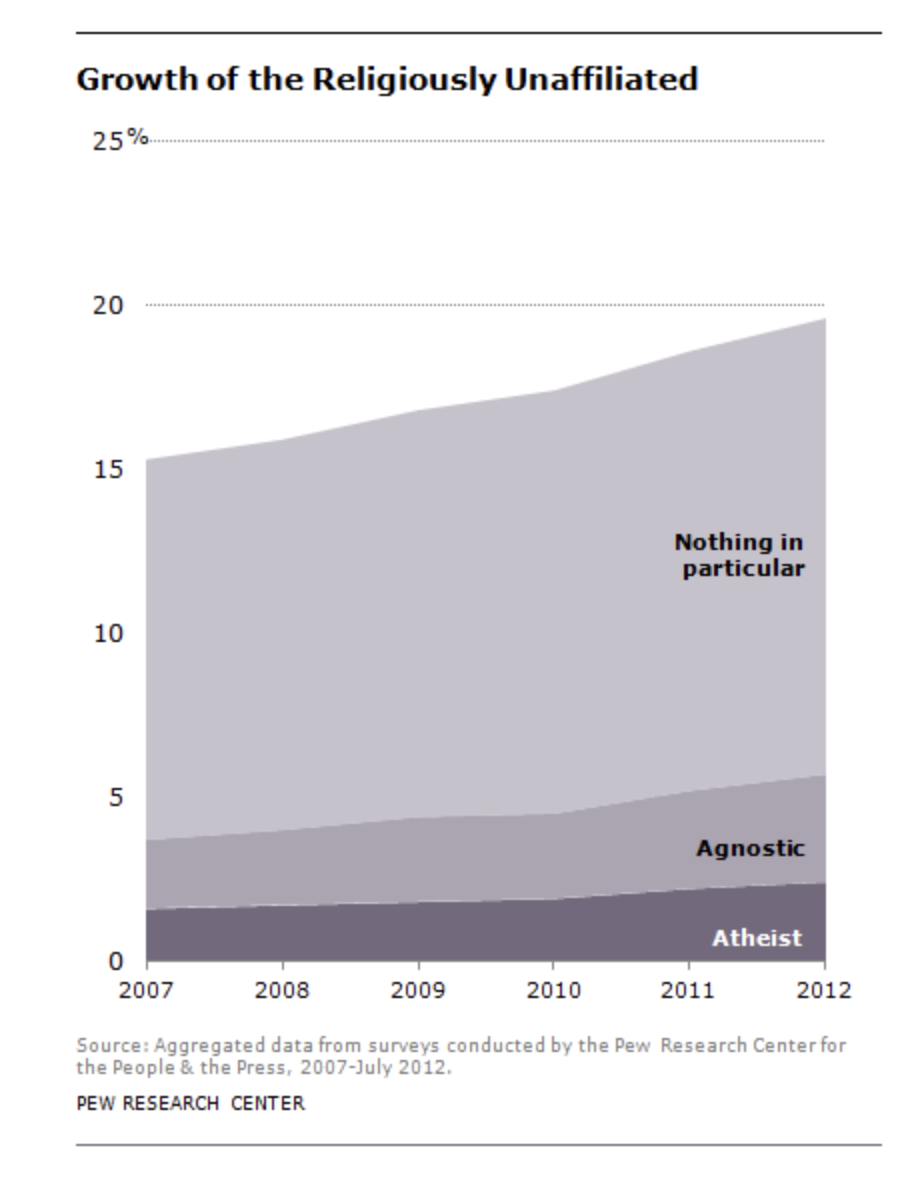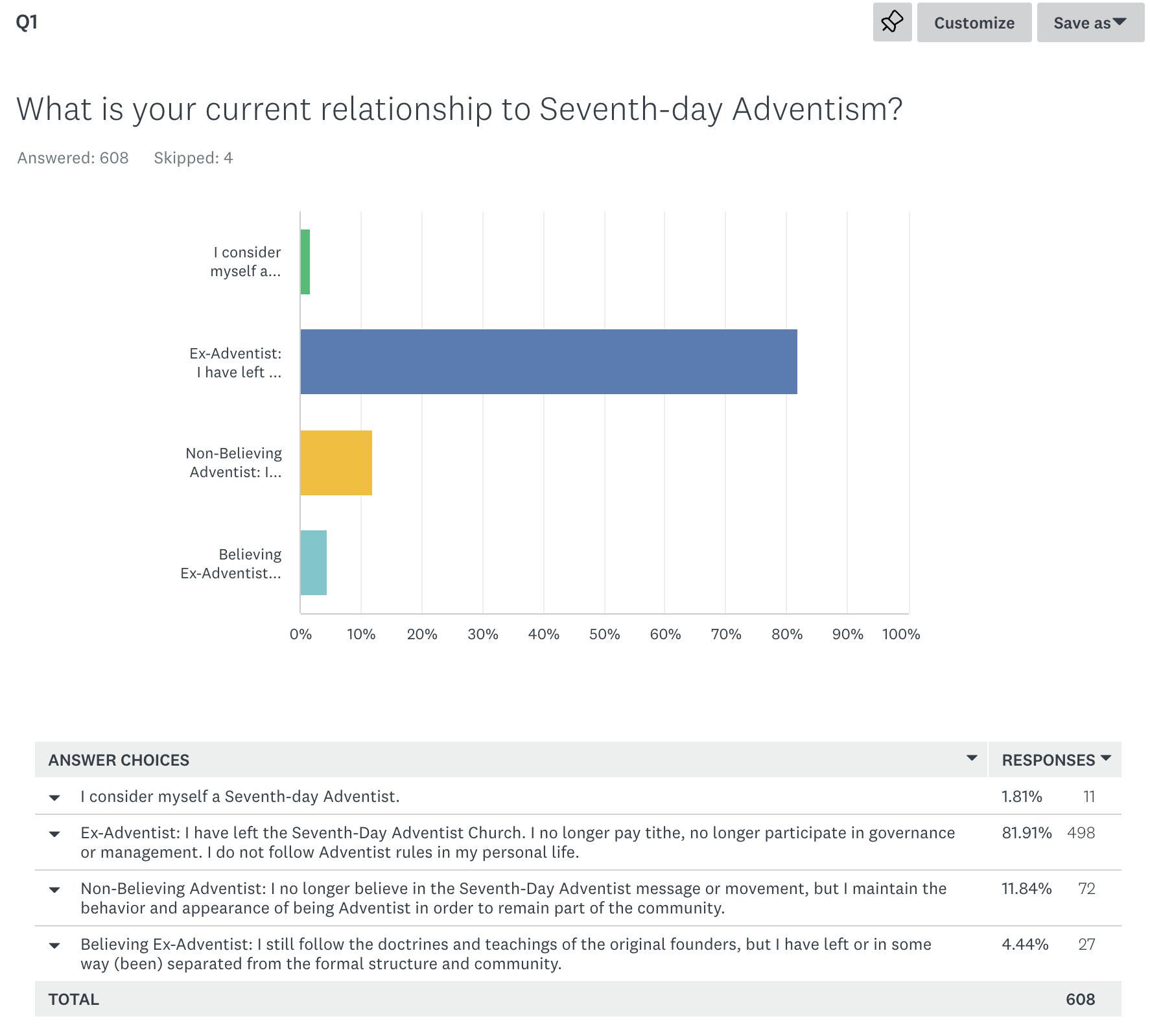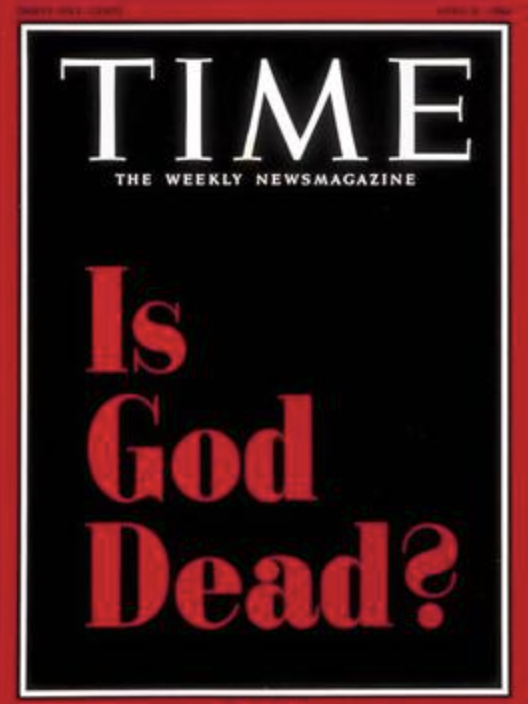The decline in religion in America and around the world
A trend toward no religion
As more and more Seventh-day Adventists turn themselves into ex-Seventh-day Adventists, it would be instructive to look at recent trends in church affiliation in the US and the world at large. In an earlier posting for this website called Leaving the Church, I referred to a Pew Poll for the year 2021. The Pew Research Center has been a major source for numbers on adherents (and non-adherents) to various religions in the US since 2007. Therefore, I will focus on the span from 2007 to 2021, the year of its most recent results.
In 2007, self-identified Christians represented 78% of the US adult population. This had slipped to 63% by 2021. (In my earlier post, it was indicated as 64%, because the source I used there rounded differently.) This is drop of 15% percentage points, which, to my mind, represents a pretty hefty chunk over a relatively short span of time, about a percentage point per year. This trend has American religious leaders clearly worried as evidenced by the $20 million dollars spent on the “He gets us” Super Bowl ads.
Where are these Christians going? Not to other religions. Other religions, such as Judaism, Islam, and Hinduism have collectively seen their membership increase slightly from 5% to 6% over the period in question.
The rise of the ‘nones’
The big increase is in the category called “nones.” Nones are composed of those who describe themselves as atheists, agnostics, or “nothing in particular.” From 2007 to 2021 the “nones” category steadily increased from 16% to 29% of the adult population of the US. This is a 13-percentage point increase, which is almost identical to the 15 percentage point decrease incurred by Christians. It would certainly appear that the Christians’ loss is the nones’ gain. Bear in mind, as well, that the 16% to 29% increase in nones represents a near-doubling of their numbers over this relatively short time span.
atheists, agnostics, or “nothing in particular.” From 2007 to 2021 the “nones” category steadily increased from 16% to 29% of the adult population of the US. This is a 13-percentage point increase, which is almost identical to the 15 percentage point decrease incurred by Christians. It would certainly appear that the Christians’ loss is the nones’ gain. Bear in mind, as well, that the 16% to 29% increase in nones represents a near-doubling of their numbers over this relatively short time span.
Another way of looking at it is that Christians outnumbered nones by 5 to 1 in 2007. By 2021, Christians outnumbered nones by only 2 to 1. So, clearly, nones have been making great strides in terms of numbers.
But let’s break down the nones category, which is widely disparate in terms of the beliefs of the individuals within. The atheists (those indicating that they do not believe in God) represented 2% in 2007. This climbed to 4% in 2021. So atheists are still a very small percentage of Americans. However, their proportion has doubled. Agnostics (those who responded that they are not sure if there is a God) represented 2% in 2007 and 5% in 2021. Once again, a relatively small proportion of the US population, but more than doubling over the last decade and a half. The “nothing in particular” category has grown from 12% in 2007 to 20% in 2021. Lest atheists and agnostics enthuse that this category represents people who are necessarily non-theists, it does not. People in this category are very variable. Many espouse a believe in a God or gods; they just don’t identify with any specific religion.
Although the Pew Research Center did not survey Americans about religious orientation before 2007, the Gallup organization did, although not to such a systematic extent. It found that in 1972, for example, approximately 90% of Americans self-identified as Christians, with miniscule percentages considering themselves to be atheists. So if we cast back to 1972, we see that the percentage of people in this country identifying as Christians has dropped dramatically, from 90% in 1972 to 64% presently.
Where are losses in Christians coming from? The answer is primarily the Protestant denominations. For whatever set of reasons, Catholics have experienced a much smaller decline in the same period.
Incidentally, 60% of Protestants describe themselves as “born-again or evangelical Christian,” while 40% say they are not or declined to answer this question on the survey. Perhaps those who are should read my previous post outlining some of the problems of evangelical Christianity.
A global phenomena?
What about the world scene? Researchers Ronald Inglehart and Pippa Norris have been following many thousands of survey respondents in 49 countries and several subnational territories (such as Northern Ireland) for which they could obtain data regarding religious belief. They asked one pertinent question on the survey: How important is God to you? Answers could be marked on a 1 to 10 scale, with 1 indicating “Not at all” and 10 indicating “Very important.” The researchers noted a large trend starting about 2007. From that point to 2019, the last point of data collection, 43 of 49 countries showed a decline in religiosity by this measure. Interestingly, the nation with the steepest drop was the USA, which moved from 8.2 out of 10 in 2007 (or slightly before) to 4.6 out of 10 in 2017. Other large declines were registered in Chile, Australia, Norway, Iceland, Switzerland, Turkey, Finland, and Italy.
Those who study religion realize that people who self-identify as Christian (or another religion) may not necessarily believe in God. Thus, they may attend church (or synagogue, or whatever) and go through the rituals because of tradition, social pressure, habit, or not wanting to disappoint family. Such is apparently the case in present-day Ireland. The data from our survey can be used to illustrate the existence of what can be called “social believers”, those who appear to be in the faith but are only putting on appearances. As you can see, nearly 12% of our respondents indicated they were “Non-Believing Adventist: I no longer believe in the Seventh-Day Adventist message or movement, but I maintain the behavior and appearance of being Adventist in order to remain part of the community.”
respondents indicated they were “Non-Believing Adventist: I no longer believe in the Seventh-Day Adventist message or movement, but I maintain the behavior and appearance of being Adventist in order to remain part of the community.”
From previous research done by my colleague Dr. Tom Arcaro (and this project’s Principle Investigator) we know that there are ‘social believers’ in all religions. There may be one in the pew or prayer mat next to you.
Ireland was hailed by Pope Paul VI as the last Catholic country, and for many Irish to be properly Irish was to be Catholic. But the times they are a-changin’. A seemingly large percentage–78%– of Irish currently identify as Catholic, but this is down considerably from recent decades.
Studies show that how they identify and how they behave are often two entirely different matters. Weekly Mass attendance, for instance, was 85% in 1990. It had slipped to 65% by 2002. And by 2007 it stood at a mere 34%. In a 2014 study, author Tom Ingles interviewed 93 self-identified Irish Catholics and discovered that only 28 could be, as he put it, religiously “convinced.” And the Archbishop of Dublin recently lamented that only 20% of Irish Catholics in his estimation are “true believers.” Further, according to a recent European Social Survey, the percentage of “nones” is rising rapidly in Ireland, from 14% in 2004 to 32% in 2018. That represents a more than doubling of nones in a decade and a half. So the firmly Catholic Ireland appears to be firmly Catholic no longer.
More atheists than the data show?
Another note should be made on difficulties in naming and labels. As indicated above, the “nones” category contains the designation “nothing in particular.” While some observers imagine this to mean an amalgam of atheists and agnostics, this is not the case. Many people in the “nothing in particular” category are religious, but simply don’t identify with a particular denomination or are in some other similar circumstance. On the other hand, many who profess to be of one religion are actually non-believers, as studies have ascertained. And many who claim not to believe in a deity still do not call themselves atheists. For example, in one study 48% of the French respondents claimed not to believe in a deity, but only 19% claimed to be atheists. In the same study 41% of Norwegians claimed not to believe in a deity, but only 10% self-identified as “atheist.” If results from these French and Norwegian samples are generalizable, it may very well be the case that surveys that ask for religious belief are underestimating the number of actual atheists out there.
 God may not be dead, but she is losing popularity
God may not be dead, but she is losing popularity
As Seventh-day Adventists appear ever more prone to leave their church, they can be assured that they are in the company of millions upon millions of former religious adherents in their nation and around the globe. Most estimates predict that the rate of disengagement will only accelerate in future years. Current treads indicate a net loss for many religions and an overall trend toward a more secular world. God may not be dead, but the data show she is losing popularity. This is clearly a case of ‘stay turned for further developments’.
Please contact us or leave a comment if you have any questions or feedback.


 Follow
Follow